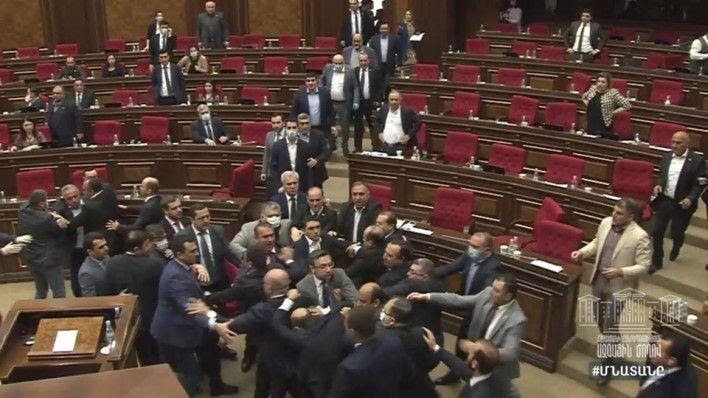
Punches being thrown in politics is not a new thing, and it isn’t even exclusive to one part of the world. I recently read that Robert Hughes missed Tony Abbott’s head with an attempted king hit during the Republic versus Monarchy debates in Australia. There have been similar incidents of coming to blows in democracies including the United States, the United Kingdom, Italy, South Korea and elsewhere.
However for a country that is trying to recover from nearly three decades of post-Soviet coma – with a dose of revolution mixed with populism, while surrounded by aggressive neighbors, and with significant social and economic challenges – this incident marks a setback for what the people set out to achieve in April to May of 2018.
The incident itself may seem minor in isolation, but it comes hot on the heels of another scuffle outside Parliament where a high-ranking government member of the National Assembly punched an extra-parliamentary opposition activist in the streets of Yerevan. And what these incidents expose is the real setback.
- They expose that there are certain people who were elected to the Parliament who should simply not be there. They rode on the coattails of the leader of the revolution, and were only elected because of his endorsement.
- Some of these more peripheral revolutionaries have proven very effective. Others, including a few loitering in the executive branch of government, have proven they lack the temperament, the know-how, the culture and the ability to govern.
- This latter group is a combination of people who have not been able to let go of the rear view mirror, focusing on vendettas and vengeance, and of people who have consciously worked to bugger up the revolution’s opportunity to unite the country, resorting to divisive (and false) policy priorities such as changing the country’s anthem or coat of arms.
- If some of these efforts were placed in social and economic reforms, attracting migration and women’s and minority rights, there would be greater headway being made by Yerevan.
It would be ignorant to suggest there haven’t been any improvements from a past the country should never look back to, particularly in eradicating corruption, increasing freedoms and tightening up foreign policy – most specifically the Foreign Ministry’s recent messaging moving Yerevan away from the dreaded Madrid Principles being proposed by world powers, which would threaten the right to self-determination of the Republic of Artsakh.
This brings us to the opposition to the government, those within the parliament and outside. An objective political scientist will quickly adjudicate that those who are taking poll advantages from government missteps are those powers who are disassociated from the previous regime. Make no mistake, there is no appetite in Armenia for any apologists or nostalgists of what was 20 years of unrepresentative polity that has been outwardly rejected by the people.
This requires any power that wants to position itself as a genuine contender to be an alternative force to be honest with itself and to the public – to humbly admit to past wrongdoings, to change their faces and messaging from anything that would hint they haven’t learned from said past, and to show they have heard the loud and clear message from the electorate. This requires them to exit their echo-chambers that scream of relevance deprivation.
Otherwise, whether it be a punch-up in Parliament or the current government’s missteps in social, economic or security policies, any change that will one day come will not include them in the mix of the thoughts of the people. The people will forever remember their victory in April to May 2018, when most importantly they took back their right to a voice in their future.
Therefore, when they choose to dedicate that voice elsewhere, it will be the honest, the more respectful and the most trustworthy who will be deemed worthy and earn the people’s trust.
In conclusion, it is the government’s responsibility to clean up its backyard to prevent similar embarrassments to those recently witnessed, step away from false policy agendas and unite the electorate. There is also an obligation on the rest of the country’s political hopefuls to get serious and step onto the side of the people.
After all, in a democracy, the people represent the only side that really matters.


Be the first to comment